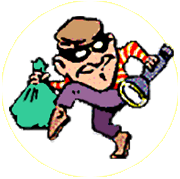 |
 |
 |
|
|||
|
Travelling Security Precautions
Why is it that when we're on the road, we think the bad guys are on vacation, too? I can tell you not only are they still on the job, they know an easy mark is someone whose guard is down and who is in unfamiliar territory. Let's review the Savvy Traveler's basic security precautions. First of all, if you're going abroad, photocopy the opening page of your passport and keep that in a separate place in case you lose the real McCoy. Even if you're not going abroad, heck, even if you're only going around the block, photocopy the contents of your wallet. It'll make replacing credit cards and other stuff easier should your wallet vanish. 
Do a little editing. Do you really need your local library card, supermarket check cashing card, and health club ID while you're on vacation? Probably not. Why bother carrying those items? Thieves who prey on travelers like to take advantage of confusion. They look for easy marks who set down luggage while they're busy signing up for a rental car or checking into a crowded hotel. Airports are favorite hunting grounds for those kinds of criminals. Keep your belongings close to you at all times. Remember, even if you're overseas, you don't have to be a good will ambassador for America if you feel you're getting ripped off. In China, three-person teams target tourists in souvenir shops. One person bumps you so you knock a vase off a shelf. Then the incensed shopkeeper appears to tell you what an expensive mistake that was, while a seemingly unrelated third local explains to you that you'd best do the right thing and pay the man. If you didn't knock over that vase, insist on calling the police. At favorite tourist destinations, you may be approached by a free-lance guide. If you hire him or her and suddenly find yourself in a store being pressured to make purchases, walk out. That's a common maneuver in China, Egypt, and Morocco. In Mexico City and Jakarta, be cautious of riding in cabs that your hotel hasn't arranged; they've become a favorite venue for robbing tourists. And while most cities abroad are probably safer after dark than your average big American city, don't take that for granted. When you arrive in a new place, talk to locals about what precautions you ought to take when seeing the city. Especially at night. There are still bands of street kids in Paris and Russian cities who may crowd around you begging even as they expertly empty your pockets. Don't be shy about shouting loudly and causing a scene. Never pull over to a lonely part of a highway because some helpful motorist shouts out his window that you have a flat tire. That's sometimes the prelude to highway robbery. Let the locals worry about stranded motorists... or get robbed by them, as the case may be. You pull over at a gas station. I just returned from Brussels, where signs in some shops near the city's tourist gathering spot, the Grand Place, advise you to beware of pickpockets. And if that's a problem in Brussels, you can be sure it's a problem in less civil cities. These days, you don't need a lot of cash or even travelers' checks in major tourist destinations. ATMs not only provide you cash when you need it, you receive a favorable exchange rate. If you're touring by car, never leave anything visible that suggests you have luggage inside. Smashing windows and grabbing camera bags is a favorite sport all around the world. Don't leave baggage in your trunk overnight. If you're a man on a long flight, don't leave your wallet in a sport coat you stuff in an overhead luggage bin. It may disappear while you snooze. So hit the road and have a ball. But just remember The Shadow's advice: Who knows where evil may lurk? I'm Rudy Maxa, the Savvy Traveler, for Marketplace. |
 | American Public Media Home | Search | How to Listen ©2004 American Public Media | Terms of Use | Privacy Policy |